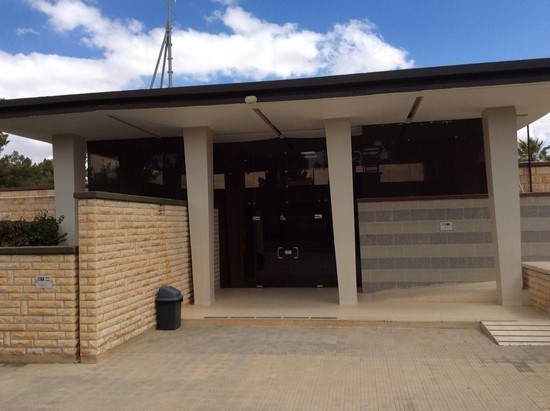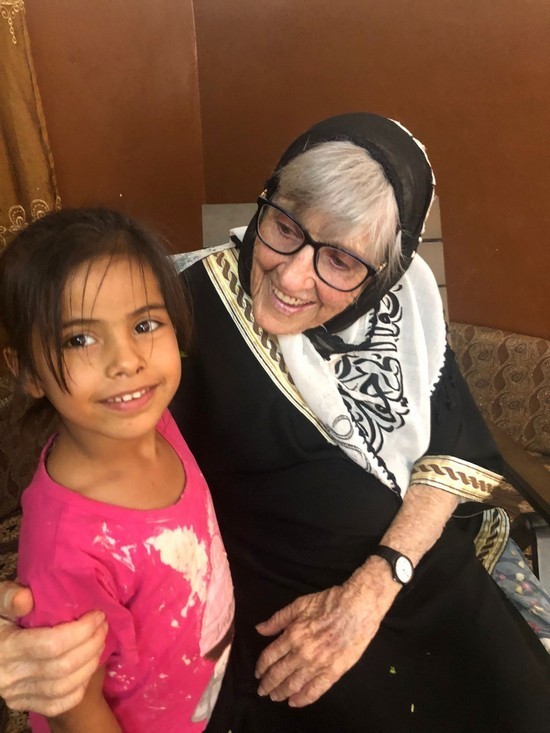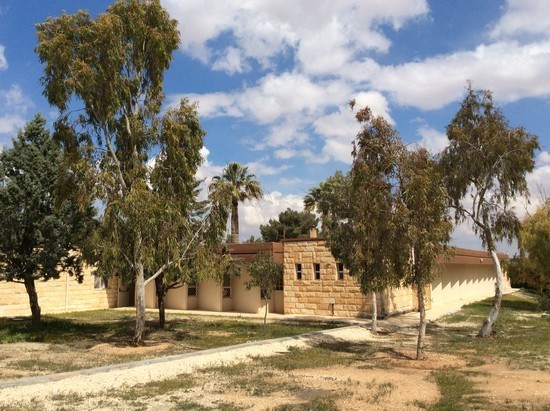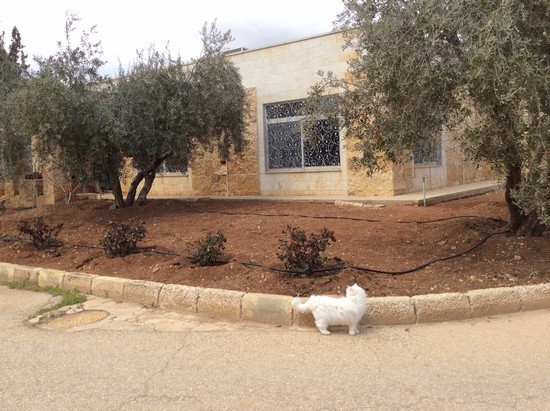Jordan recently celebrated
Mother’s Day, an occasion for many to
remember one woman who lives in the north of the country and who was not only
foster mother to nine babies in need, but also put Mafraq on the map as a
regional center for the treatment of tuberculosis (TB).
اضافة اعلان
Since 1965,
Mafraq has been home for Aileen Coleman, an Australian national born in 1930,
who graduated with a degree in nursing, midwifery and hospital administration.
She has dedicated her life to a people and their culture that she has accepted
as her own.
Her story would
not be complete without the inclusion of the late Dr Eleanor Anne Soltau, a TB
specialist who was born in Tennessee in 1916. Together, they founded
Annoor Sanatorium for Chest Diseases (Annoor is Arabic for “The light”), which Aileen
registered in the US as charity.
 View of the front entrance of the Annoor Sanatorium for Chest Diseases, Mafraq.
View of the front entrance of the Annoor Sanatorium for Chest Diseases, Mafraq.
It all began in
1957, when Coleman met Soltau while working at a hospital in Aroub,
Palestine.
They shared compassion for their bedouin patients, whose nomadic lifestyle
often prevented a complete recovery from TB, an otherwise curable disease. This
prompted them to move to Jordan in 1965 and treat bedouins closer to home.
Aileen found it
hard to adjust to being a
woman in a male-dominated society until she realized
that she had to be the one to change, which “made coping a lot easier”, she
mused. It was at this point that she shed her Western values, which considered
the floor a place of “dirt and
disease”, and accepted the bedouin custom of
eating seated on the floor. She also stayed true to her belief – “I did not
come here to Westernize, I came here to learn” – which is a sentiment expressed
in correspondence she shared with Abu Hounaik, otherwise known as Glubb Pasha.
 Photo of Aileen Coleman with her namesake, young Aileen, out in the badia.
Photo of Aileen Coleman with her namesake, young Aileen, out in the badia.
With $25 between
them and a large dose of faith, Coleman and Soltau departed for
Amman where a
meeting had been arranged with the minister of health at the time, Dr Ahmad
Abu-Qoora. After they presented the idea of the TB hospital project, the
minister asked them who they worked for. On hearing that they only represented
themselves, after a long moment of silence the minister replied: “And how can I
help you? Where would you like to go?”
“I did not come here to Westernize, I came here to learn.”
The minister
recalled a conversation about the problems the bedouins faced in the north of
the country and suggested that they look at Mafraq. With government approval,
their fate was sealed.
In Mafraq, they
realized that their options were limited, but in time found a suitable
two-story house. After finalizing the paperwork, they began work on converting
the modest building into a 16-bed hospital where they stayed for the next eight
years, persevering in cramped conditions and with scant finances in the belief
that their faith will overcome obstacles; they were rarely disappointed.
Coleman never
worried about raising the vast sums of money for the annual budget. She only
knew that somehow the donations arrived and that God would always provide. Such
was the case when Lester Gates, an American farmer, visited Jordan in 1966 and
offered to volunteer his services as a handyman for six months. He stayed for
22 years. It was Lester who convinced Aileen to build a place of their own. In
1972, he financed the purchase of a 107-dunum plot of land on the outskirts of
Mafraq, as well as the construction of a 40-bed hospital, designed around a
courtyard so that every bed could have a window view. And it was Lester who
planted the 800 olive trees that provide the olives and olive oil for patients’
meals.
 The Annoor Sanatorium for Chest Diseases, Mafraq, [view of the men’s hospital rooms at the Anoor...]
The Annoor Sanatorium for Chest Diseases, Mafraq, [view of the men’s hospital rooms at the Anoor...]
By the late
1980s their workload was increasing. Soltau had established an outpatient
clinic in Ras Al-Naqab in the south, while Coleman developed outreach
programs throughout the desert regions. Travelling constantly, they did not
have a moment to spare. Little did Coleman know what personal challenge she was
about to face when a terminally sick bedouin woman from
Syria arrived with a
young baby girl. The mother died shortly after and Aileen was asked to care for
the girl that she named Noura, who stayed with her for three years. Thus began
the many years of fostering babies in need as a result of the trust he tribal elders
of bedouin communities had in her.
After Noura,
Aileen looked after twin boys whose mother had died in childbirth, Anwar, now a
storekeeper for the UN at the
Zaatari refugee camp, and Munir who grew up in
Finland; then Thuraya, a new-born baby girl in need of care after her mother
died from heart failure who is now happily married and a mother in her own
right and welcomes Coleman to her home in Safawi as the “raeesa” (or “boss”) on
a regular basis.
Shortly
afterwards, Aileen helped a woman who was left partially paralyzed after
suffering a heart attack during delivery of triplets, one of whom did not
survive. Coleman returned to Mafraq with two premature baby girls, “in a box”,
in need of constant care. Despite the lack of sleep, the twin girls, Asma, now
a happily married mother, and Ibtisam, a teacher, gave Coleman much joy; 30
years later, they continue to do so.
In 2007, Coleman
stepped up again and took in Laith, who was returned to his family in the Badia
five years later, and in 2013, she cared for an Indonesian boy who was born at
the hospital and who she named Nour El Huda, “light of the one who will lead me
to God”, until he was adopted in Indonesia one year later. They all had happy
endings.
 View of Aileen Coleman’s house with Cloud the Cat in the foreground.
View of Aileen Coleman’s house with Cloud the Cat in the foreground.
Coleman was so
devoted to her work that she never married. Even an offer of 10 camels and
JD3,000 was not going to change her mission in life: caring for the bedouins
who she counts as her very dear friends.
After Soltau’s
death in 1997, Coleman took on the added responsibility of the Ras al Naqab clinic.
Travelling from Mafraq to Ras Al Naqab once a week, she soon realized “how fast
a Volvo can go!”
In 2012, at the
age of 82, Coleman handed over the day-to-day administration of the hospital to
Herb Klassen, the former administrator of the Ras al Naqab clinic, and focused
on training students in collaboration with the nursing department of
Al al-Bayt University.
By 2017, she
thought her days as a foster mother were over. However, that thought was short
lived when she discovered a 9-month-old baby girl in need of hospital care
during a visit to friends in a remote village. After reaching an agreement with
the child’s grandfather, which was written on paper and sealed with a
thumbprint of pomegranate juice, little Nour returned with Coleman and stayed for
eight months. Now five years old, she considers Coleman her “special grandma”.
Despite the
challenges, Coleman role was “to love and love and love ‘em”, she says with a
radiant smile that lights up the room.
Coleman was awarded the
King Hussein Medal of Distinction for Humanitarian Services in 2000.ag
Read more Lifestyle
Jordan News



